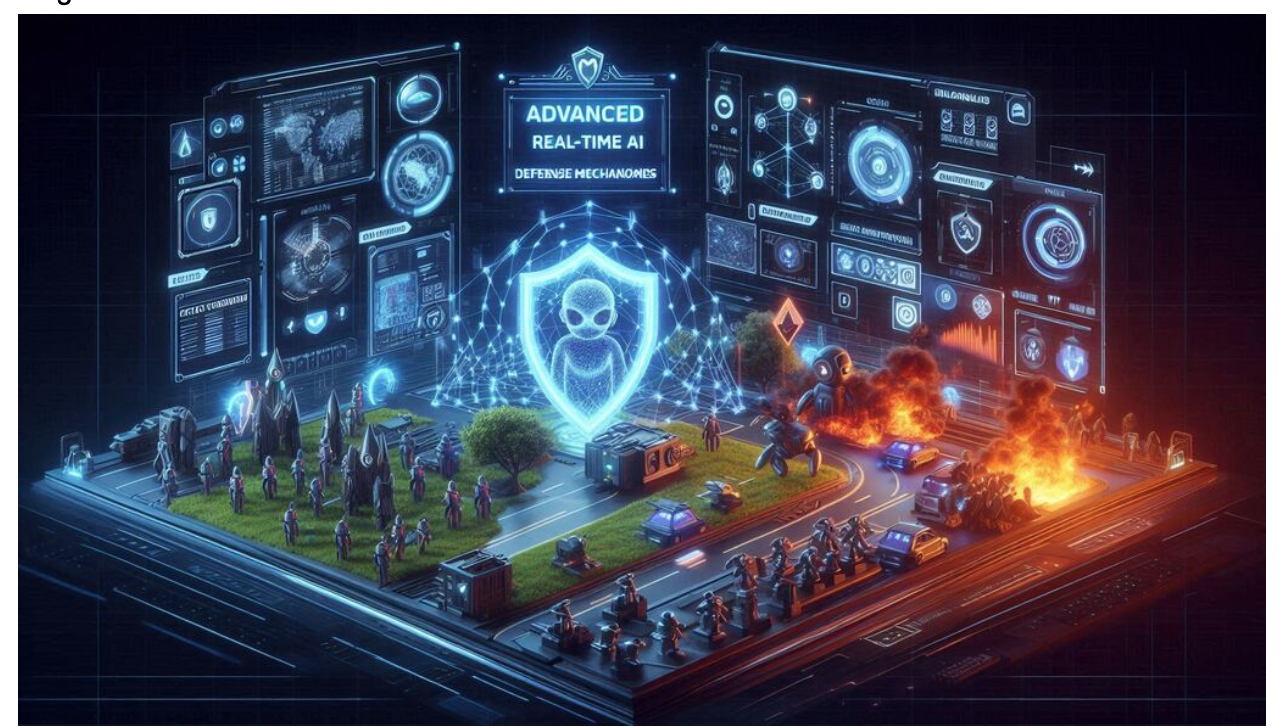In the ever-evolving world of online gaming, cheating remains a persistent challenge that undermines the integrity and enjoyment of games. As gaming technology advances, so do the tactics employed by cheaters. To combat these threats, developers are turning to real-time AI defense mechanisms that offer sophisticated solutions to detect and prevent cheating. This blog delves into the advancements in real-time AI defense systems, exploring how they are transforming the fight against game cheats and ensuring a fair gaming experience for all players.
Understanding Real-Time AI Defense Mechanisms
Real-time AI defense mechanisms are advanced systems that leverage artificial intelligence to monitor, detect, and counteract cheating activities as they happen. These systems are designed to provide immediate responses to suspicious behavior, ensuring that cheats are identified and neutralized before they can impact the gaming experience.
Key components of real-time AI defense mechanisms include:
- Behavioral Analysis: AI algorithms analyze player behavior in real-time to identify anomalies and patterns indicative of cheating. By examining factors such as reaction times, movement patterns, and in-game actions, AI can detect deviations from normal gameplay.
- Machine Learning Models: Machine learning models are trained to recognize known cheat signatures and suspicious activities. These models continuously learn from new data, improving their ability to detect emerging cheats and adapt to evolving cheating methods.
- Real-Time Monitoring Dashboards: Developers use real-time monitoring dashboards to oversee gameplay and identify potential cheating incidents. These dashboards display live data and alerts, enabling quick responses to suspicious activities.
- Automated Response Systems: AI-powered systems can automatically take action against cheaters, such as issuing warnings, temporary bans, or permanent suspensions. This automation ensures swift and consistent enforcement of anti-cheat policies.
- Anomaly Detection: AI systems employ anomaly detection techniques to identify outliers in player performance and behavior. By flagging unusual patterns, these systems help pinpoint potential cheaters.
- Integrity Checks: AI tools perform integrity checks on game files and memory to detect unauthorized modifications or hacks. These checks help prevent the use of cheats that alter game code or data.
Advancements in Real-Time AI Defense
The field of real-time AI defense mechanisms has seen significant advancements, enhancing the ability to combat game cheats effectively:
- Enhanced Accuracy: Modern AI algorithms offer improved accuracy in detecting cheats by analyzing a broader range of data and using more sophisticated models. This reduces false positives and ensures that legitimate players are not unfairly penalized.
- Adaptive Learning: AI systems continuously adapt to new cheating techniques through adaptive learning. By incorporating feedback and data from ongoing gameplay, these systems stay ahead of evolving cheat methods.
- Integration with Game Engines: Real-time AI defenses are increasingly integrated into game engines, allowing for seamless monitoring and protection within the game environment. This integration ensures that defenses are active and effective throughout gameplay.
- Collaborative Efforts: Developers and AI experts are collaborating to share knowledge and resources in the fight against cheating. Collaborative efforts lead to the development of more robust defense systems and a collective approach to tackling cheating challenges.
- Enhanced User Experience: Advanced AI defenses are designed to minimize disruptions to the gameplay experience. By providing unobtrusive protection, these systems ensure that players can enjoy the game without interruptions or delays.
- Proactive Threat Intelligence: AI systems use proactive threat intelligence to anticipate and prevent cheating attempts before they occur. This forward-looking approach helps mitigate potential risks and protect the integrity of the game.
Benefits of Real-Time AI Defense Mechanisms
Real-time AI defense mechanisms offer several benefits to the gaming industry and players alike:
- Improved Fairness: By detecting and preventing cheats in real-time, AI defenses ensure a fair playing field for all players. This promotes a positive gaming experience and maintains the integrity of competitive play.
- Enhanced Security: AI-powered defenses protect against a wide range of cheating techniques, including aimbots, wallhacks, and exploit tools. This comprehensive security helps safeguard the game from malicious activities.
- Reduced Response Time: Real-time detection and automated responses reduce the time required to address cheating incidents. This ensures that cheaters are swiftly identified and dealt with, minimizing their impact on the game.
- Ongoing Improvement: AI systems continuously improve their detection capabilities through machine learning and adaptive algorithms. This ongoing improvement helps stay ahead of new cheating methods and maintain effective defenses.
- Player Trust and Satisfaction: Effective AI defenses build trust among players by demonstrating a commitment to maintaining a fair and secure gaming environment. Satisfied players are more likely to engage with and support the game.
Challenges and Considerations
Despite the advancements, real-time AI defense mechanisms face several challenges:
- False Positives: AI systems may occasionally flag legitimate players as cheaters due to false positives. Developers must fine-tune algorithms and ensure accurate detection to minimize these occurrences.
- Privacy Concerns: Real-time monitoring involves analyzing player behavior, which may raise privacy concerns. Developers must balance security with privacy considerations and ensure transparent data handling practices.
- Complexity of Cheats: As cheats become more sophisticated, AI systems must continuously evolve to detect new techniques. This requires ongoing research and development to stay ahead of emerging threats.
- Resource Requirements: Implementing and maintaining real-time AI defenses requires significant computational resources and expertise. Developers must invest in infrastructure and talent to support effective defenses.
Conclusion
Real-time AI defense mechanisms have revolutionized the fight against game cheats, offering advanced solutions to detect, prevent, and respond to cheating activities. With their ability to provide immediate protection and adapt to evolving threats, AI-powered defenses are crucial for maintaining a fair and secure gaming experience. While challenges remain, the continued advancement of AI technology promises to strengthen the battle against cheating and ensure that players can enjoy their favorite games without compromise.

